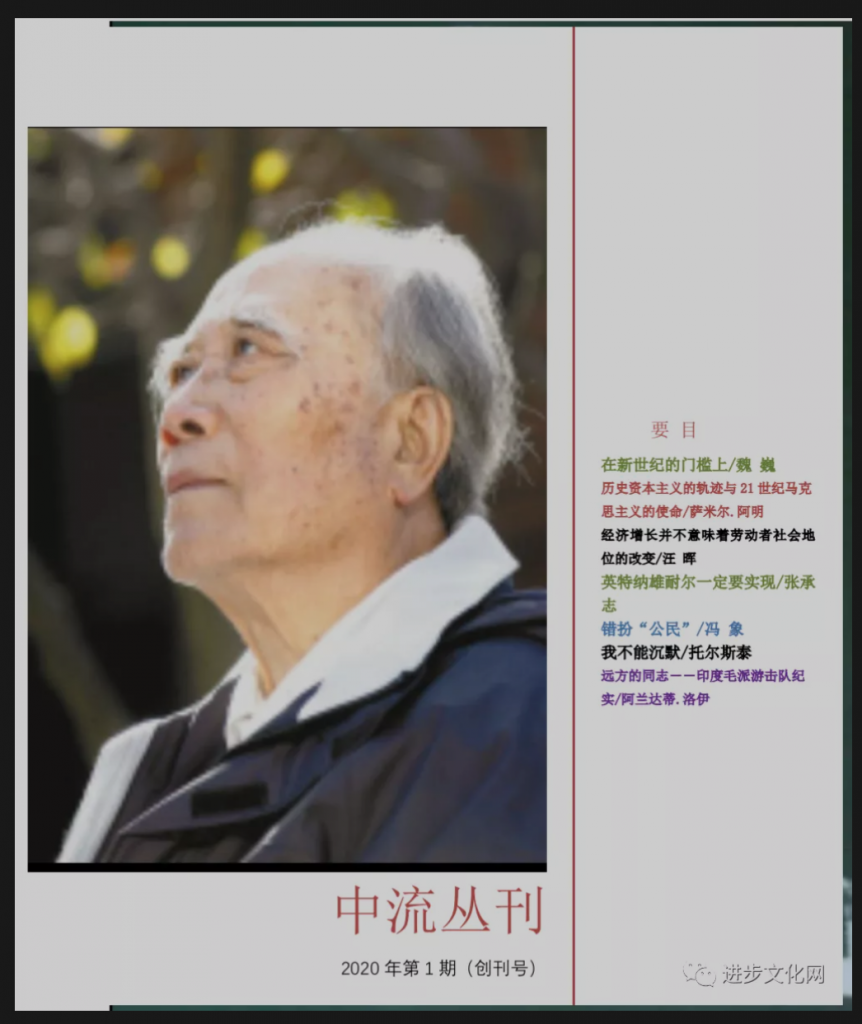On August 24, a post on the WeChat public account “Progress Culture Online” (进步文化网) announced the launch this year of a “large-scale thought and humanities magazine” to be called Midstream Collections (中流丛刋). For those whose memory of press events in China goes back two decades, this is interesting news, because the name of this new online publication is a clear reference to Midstream (中流), a leftist magazine launched in 1988 by poet and novelist Wei Wei (魏巍), pictured above.
A novelist and poet from Henan province, Wei Wei joined the revolutionary Eighth Route Army during China’s civil war. He held firmly to his leftist political convictions even after the end of the Cultural Revolution. Midstream, a leading leftist voice in its day, was shut down in 2001 following sharp criticism of Jiang Zemin’s so-called “July 1 speech,” in which the leader urged that private entrepreneurs be allowed to join the Chinese Communist Party.
According to a 2011 report from the official China News Service, Midstream and Pursuit of Truth (真理的追求), both magazines strongly associated with old leftist figures within the CCP (many being veterans of the Yan’an days), had continuously published articles ahead of the CCP’s 80th anniversary in 2001 stressing the Party’s “proletarian character” and strongly opposing membership by capitalists.
Following Jiang’s “July 1” speech, Wei Wei led “a group of CCP members,” including the critic Lin Mohan (林默涵) and journalist and former press official Wu Lengxi (吴冷西), in writing a petition to the senior leadership called “On the Major Political Error of the “July 1 Speech” (“七一讲话”是极其重大的政治错误事件). The petition accused CCP leaders of “surrendering to capitalism” and of carrying out a “theoretical coup d’état” (理论政变), and it directly criticized the “Three Represents,” the banner term meant to encapsulate Jiang Zemin’s legacy.
The petition from Wei Wei was published in Midstream the same month as Jiang’s speech, and the shutdown of both Midstream and Pursuit of Truth followed shortly after. The petition was itself harshly criticized by state media and prominent scholars, including economist Hu Xingdou (胡星斗), who said the petition “irrationally attacked the Party’s general secretary.”
The announcement on “Progress Culture Online” made plain the new publication’s association with Wei Wei’s leftist legacy: “Wei Wei was an outstanding contemporary proletarian writer in our country. He launched the magazine Midstream in the 1980s, and before his death [in 2008] left behind the words, ‘Continue the revolution, and never surrender.’” Noting that this year marks the centennial of Wei Wei’s birth, the announcement added that “to launch this year, and to use the name of a publication launched by Wei Wei, has clear symbolic significance for Midstream Collections in the continuation of the spirit of Wei Wei.”

So far, there is no evidence that the newly launched Midstream Collections has support from influential figures within the CCP, but it has invited speculation on social media that leftist voices are now generally more accepted as China under Xi Jinping has reembraced Marx. The crucial question may be whether the magazine is able to publish openly offline. For now, Midstream Collections is being distributed only online to users who follow the public account of the publication’s editors. But “Progress Culture Online” reports that the print edition of the publication will be released “when conditions are right.” If that does happen, it would mean that a highly visible leftist publication is able to find an official government office to serve as its sponsoring institution, something necessary in China for any publication. And that would also mean official endorsement of the magazine’s content.




















